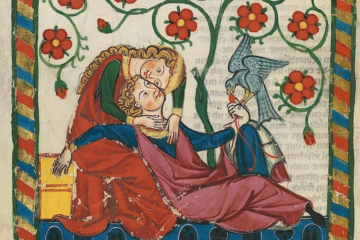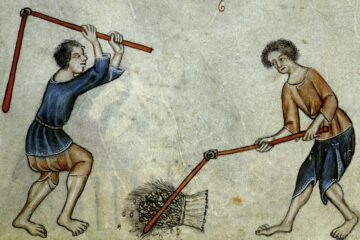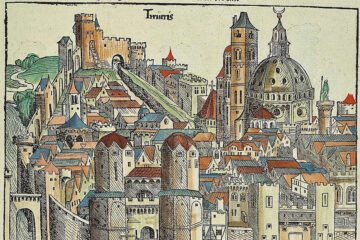Emperor Torrino I Sirius, also known as “the Founder” died at the age of 59 in the year 1116. As his title would suggest, he was most well-known for his role in the formation of the Sirius Empire, the precursor state of the Kingdom of France; much of its government, traditions, and infrastructure come from the Empire, specifically the Imperial family. Torrino I spent his late years in Aqvintia, forging an alliance with his former rival. This would prove instrumental in France’s continued existence after the Fifty Years’ War. During his time south, Torrino was engaged in leading and organizing troops. In order to gain an ally in the South, he had to help them re-establish their hold over a few rebellious lords. Unfortunately, he could not have foreseen the effects of this on his health. When he finally returned to the Empire in 1115, his health had already declined. He spent his final days in the Blue Palace outside Rosewood.
The Blue Palace was the ancestral seat of the Sirius dynasty. However, it was razed to the ground during the Fifty Years’ War. During Torrino I’s life, it served as a symbol of the extravagance and power of the Imperial family. While bedridden and confined to his chambers, the Emperor was looked after by the Head Medicus, Leech Laura. His rule weakened with his health. More and more of his responsibilities were relegated to Empress Maria de Hauteville and his son and heir, Prince Philip. During his final months, the Emperor had to suffer undermining by his subjects who for the first time in forty years could challenge him, now that he was at death’s door. There was talk of secession, Imperial reform, religious schism, doubt in the line of succession, war, famine, and all manner of things. Like vultures, the opportunists present in the Imperial court came to feed off of the dying Emperor’s goodwill mere days before his death.
Prince Philip was young and considered himself a reformer, a visionary. He set out to reform the Empire, restructure its army, and expand his lands. In his ambition, he came to clash with his father often during his last few days. Princess Celine and Empress Maria kept the Imperial family together through this time of turmoil. They made sure that both father and son were on good terms when the day finally came. Regardless, Philip, once Emperor, would undo much of his father’s legacy and his hubris would plunge the Empire into a one-way war, a war it would not emerge from fifty years later.
Emperor Torrino I Sirius died on the 29th of November 1116. He died of old age, in the Blue Palace, surrounded by those closest to him. The same day, a private funeral was held for his family and friends. His public funeral was held on the day of his birth, later that year. News of the Emperor’s death had spread far and wide and all manner of lords and commoners came to attend. While many of his neighbors loved him and some despised him, they all showed up to his funeral, out of grief, respect, or to make sure it was true. It is said that every ruler in Europe came to attend Torrino’s funeral procession.
It began at the Blue Palace, where the many dignitaries and guests beyond the Empire’s borders met. They all brought their families and their escorts, so the procession was already large at the start. The casket was transported by Imperial carriage. At the head of the procession was young Prince Philip, followed by his sister and mother. They were surrounded by the Twelve Paladins, who were accompanied by the Lord Marshal, Argonon var Emril, his Grand Marshals Athelwulf, Arthur, and Alwin, and their many Marshals. The three monarchs of the Empire followed behind, King Thomas I Rodomir of Egirth, Queen Victoria I Roswalda of Deston, and King Albert I Wisser of Munrich, accompanied by their household guards. Behind the wagon, the entirety of Europe’s high nobility formed a line. Dukes and counts from across the continent, the Queen of Oxford, the lords of Ireland, the Kings of Scandinavia, the Kaiser and a hundred of his greatest vassals, the Christian Kings of Iberia and their Moorish rivals, the Italian lords and merchants alike, the rulers of the Slavic peoples, the Roman Emperor, the Pope, the defenders of the Holy Land, the Grandmaster of the Knights Divine Order and his closest Master Divines, Muslim Sultans and Emirs, and the guests of powerful rulers beyond Europe who sent envoys to mark the occasion all showed up and joined Torrino I’s procession. As the party approached Rosewood’s gate, they were met by a large chunk of the Imperial Army. They had organized themselves and stood in formation in front of the Capital, waiting for the Emperor to return. Lord Marshal Argonon relieved them and allowed them to join the procession, escorting everyone inside the Capital. Their approach was impeded by the grieving mobs of Rosewood’s citizenry. Peasant, artisan, merchant, levy man, midwife, or servant, they all joined the procession, swarming the streets of the City. The bells of the Cathedral rang the entire day as the whole Capital was filled with the sounds of wailing. The procession came to the Cathedral and Archbishop Caroline led the funeral rites as the Emperor’s body was placed into its tomb inside the building. Rosewood mourned for the next seven days.
In his final hours, the Emperor had one of his pages draft a letter. It was never specified to whom, but it now remains in Fernyard, while a copy exists in the Imperial Library.
I have lived a full life. I have lived a good life. I am unsure of any regrets or conscious wrongdoings, but I am sure that there are many. I err as any man would. Though I was chosen by God, I am still of flesh and bone and my soul will be judged like any other and my deeds will weigh heavy on my soul and my body will decay as any other man’s.
I must admit a strange sense of envy for the common man which takes me in these moments. I have lived a life unlike any other before me and I doubt many will live like me after I am gone. However, I have given my youth, my best years, and my late years to my rule. I am ashamed to say that I am more familiar with the glimmer of my crown than the interests of my son, with the curves of my throne than the valleys and hills on my daughter’s countenance, and with the color of my robes than the color of my Maria’s eyes. The common man can spend his life with his family unlike me. I realize now that I should have done more, cared more. The only thing that consoles me in these last few moments is the knowledge that perhaps my rule has made it possible for one man to live out his years with his family by his side. That must be enough.
As for what I leave behind. I hope I left the world better than I found it. I hope I managed to follow the path God set out for me well. I hope I prepared my realm for the future. I guess all I have left is hope, hope for a future better than the past. But I entrust that hope to you. Protect it, nurture it, and develop it until you must pass it on yourself. As we keep that hope alive, we shall live on this earth until time infinitum. Do try to remember this and keep in mind that you should never forsake doing good things for the sake of doing something great.
Long after I am gone, or perhaps even a year from now, if they write about Torrino the First and his ability to unite and hold these discordant lands, then that will have been my greatest failure. If the efforts of my people are ascribed to me alone, then the heart of the Frankish will be lost to time; it then dies with me. Instead, nothing would bring me more joy than to know that one day a man born in my realm will turn around and find peace for himself and his family wherever he looks and he will not thank me, but all who are deserving, both living and fallen. He will attribute this fortune to the labors of not just me, but my House, our nobility, our Church, our army, Rosewood, and themselves combined. Above all, he will thank our Lord, Jesus Christ.
I do not wish for them to call me “the Great” for that would imply that the will of a single man is enough to carry an entire people’s lot, but we know that it takes more than a single man to rule an empire. Unfortunately, it is not a fact we are yet ready to face, so we pick our men of action, those born one in one million, and we call them heroes, uniters, and greats. However, in doing so, we forget that we may exist without them, they are so few and far between. If we rely on them to pull the weight of this world, our world will never start moving. Instead, we must brave to step outside their shadow, no matter how dark it may seem, for the light is always brighter. That is where hope lives, where our future awaits.
Dated 1116, written by Page Oscar, signed by Torrino I Sirius, but not addressed to anyone.


